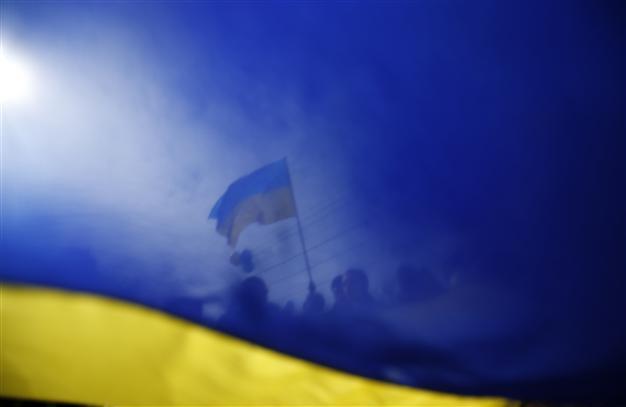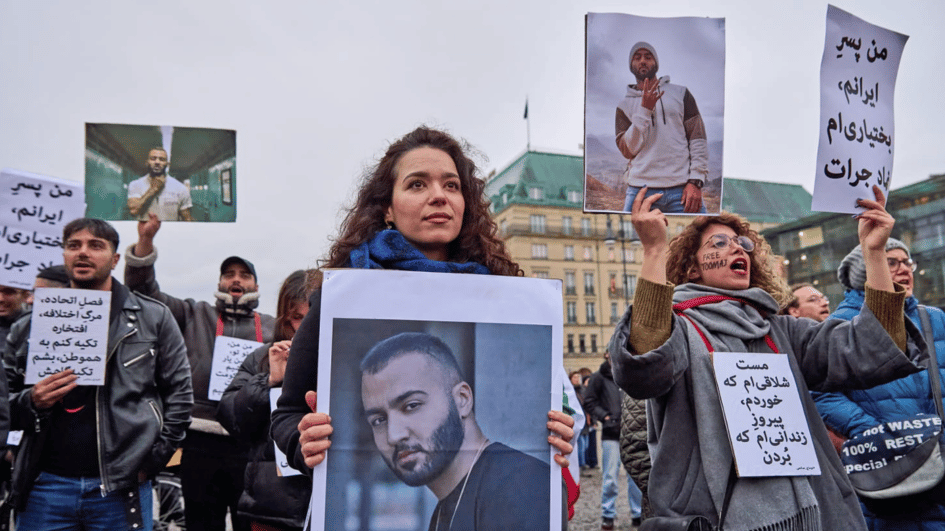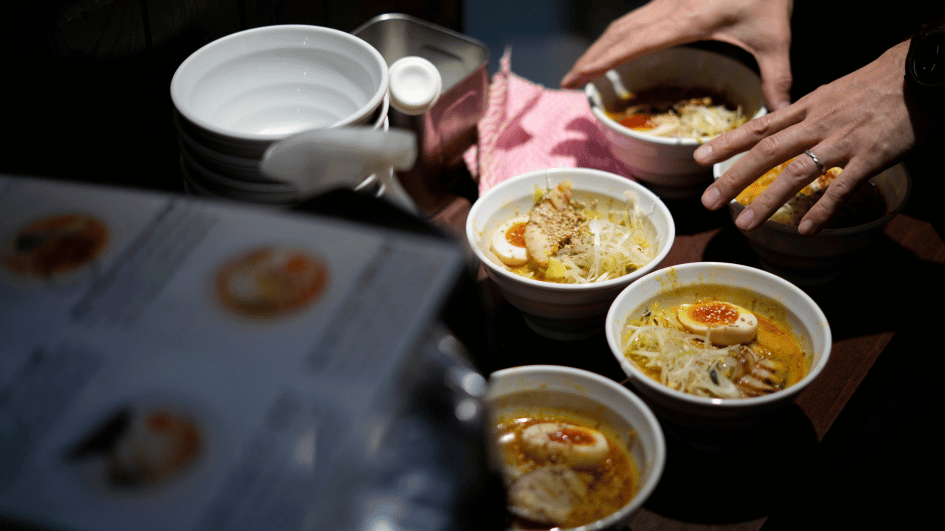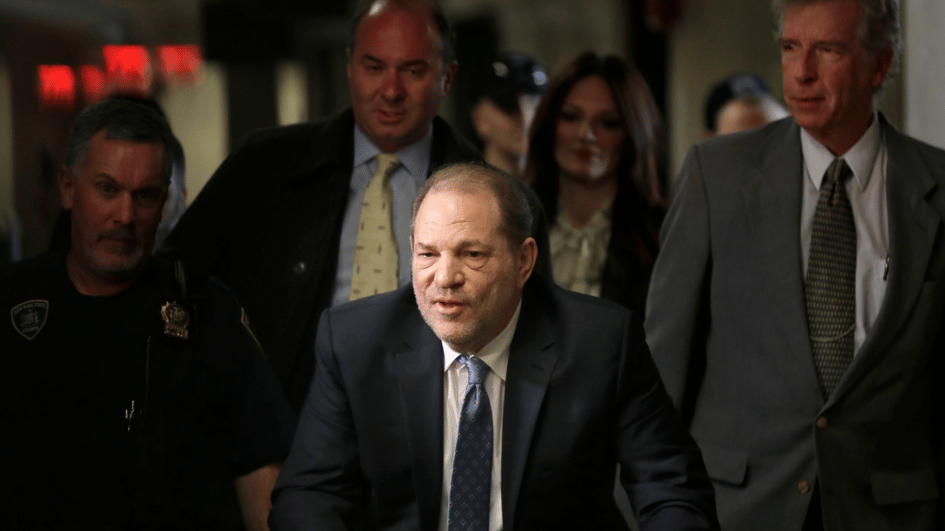Putin defends referendum decision of Crimea leaders
KIEV - Agence France-Presse

Pro-Ukrainian supporters are seen though a Ukrainian flag as they take part in a rally in Simferopol, March 9. REUTERS photo
Russian President Vladimir Putin defended breakaway moves by the pro-Russian leaders of Crimea March 9 in a phone call with German Chancellor Angela Merkel and British Prime Minister David Cameron.The three leaders spoke amid tensions on the Black Sea peninsula since the Moscow-backed regional parliament declared the Ukrainian region part of Russia and announced a March 16 referendum to confirm this.
“Vladimir Putin underlined in particular that the steps taken by Crimea’s legitimate authorities are based on international law and aimed at guaranteeing the legitimate interests of the peninsula’s population,” the Kremlin said.
“The Russian president also drew the attention of his interlocutors to the lack of any action by the present authorities in Kyiv to limit the rampant behavior of ultra-nationalists and radical forces in the capital and in many regions,” it said in a written statement.
Putin has said that Ukraine’s new leaders seized power in an unconstitutional armed coup and that Russia has the right to invade Ukraine to protect Russians living in the former Soviet republic.
Russian officials have been increasingly portraying Kyiv’s leadership as radical nationalists backed by the West, but the European Union and the United States have condemned Moscow’s move as interfering with Ukrainian territorial integrity.
“Despite the differences in the assessments of what is happening, they (Putin, Merkel, Cameron) expressed a common interest in de-escalation of the tensions and normalization of the situation as soon as possible,” the Kremlin said.
Meanwhile a statement released by Cameron’s office said “President Putin agreed that it is in all our interests to have a stable Ukraine.”
“He said that Russia did want to find a diplomatic solution to the crisis and that he would discuss the proposals on the contact group with Foreign Minister (Sergei) Lavrov tomorrow,” a Downing Street spokeswoman said.
Cameron had made clear to Putin that Britain, along with its European partners and the United States, “want to work with Russia to find a diplomatic solution to the situation in Ukraine, including Crimea.”
The British prime minister told Putin that “we recognize the right of all Ukrainian people to choose their future” and that elections scheduled for May “provide the best way to ensure the elections are free, fair and inclusive.”
Ukraine PM to visit US
For his part, Ukraine's interim Prime Minister Arseniy Yatsenyuk said on March 9 he would travel to the United States this week for crisis talks with senior officials.
"I am going to the United States for meetings at the highest level aimed at settling the situation in Ukraine," Interfax quoted Yatsenyuk as telling a government meeting.
Yatsenyuk said the next cabinet meeting on March 12 would be conducted by his deputy but did not specify when he would be travelling to Washington.
The visit to Washington will be the interim premier's first since he came to head the cabinet.
Meanwhile, thousands took to the streets for rival pro- and anti-Kremlin rallies across Ukraine yesterday as the West and Moscow dug in their heels over a deepening crisis in Crimea.
Pro-Russian activists attacked a pro-Kyiv rally in Crimea with clubs and whips March 9 as thousands took to the streets across Ukraine in rival demonstrations, escalating separatist tensions in the country.
Illustrating the divisions in Ukraine, interim president Oleksandr Turchynov led a minute of silence at the Kyiv rally for demonstrators killed in three months of protests that led to the ouster of pro-Kremlin president Viktor Yanukovych.
In contrast, in the eastern city of Donetsk pro-Moscow activists paid tribute to a feared riot police unit accused of shooting at protesters in clashes in Kyiv that left around 100 dead late last month.
In the Crimean capital Simferopol, hundreds of protesters took part in separate rallies for Ukrainian unity and for joining Russia that passed off peacefully. Around 1,000 people were at that demonstration, while some 10,000 turned out for the rival one on Lenin Square across town where sea of Russian tricolors could be seen.
Pro-Russian lawmakers in the region are planning a referendum on March 16 on becoming part of the Russian Federation, a move that has been dismissed as “illegitimate” by the new Western-backed government in Kiev.
The protests come after a new marathon round of phone calls by U.S. President Barack Obama seeking to defuse the Cold War-style standoff in the ex-Soviet state.
Foreign observers from the Organization for Security and Cooperation in Europe (OSCE) have repeatedly been blocked by gunmen from entering Crimea to get a first-hand look at the situation.
A number of security incidents in Crimea in recent days point to the situation worsening, with Ukrainian border guards reporting the arrival by land and sea of 60 Russian military lorries on the rugged peninsula with a population of two million people. The border service yesterday also said “Russian extremists” had attacked a Crimea radar post.
















